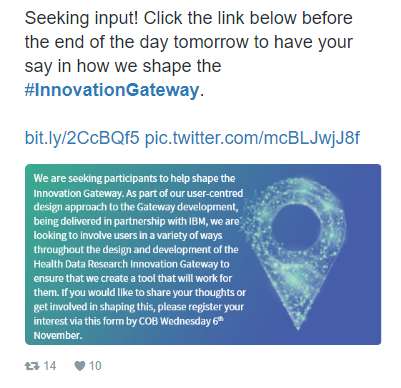November monthly round up
28 November 2019
November has been another busy month for us in the lead up to Christmas, including a trip to Canada and some new members of staff in the Central Team!
Tweet of the month:
4 November, Earning and Building Public Trust in Health Data Research, led by Amanda White
Location: London
For the first time, the HDR UK community of researchers, public engagement professionals and patient representatives came together to review our emerging strategy for engaging and involving patients and the public in our research. Over 50 people from across the UK attended this inaugural meeting to get to know each other, learn about each other’s work with patients and the public and to talk about how we can work together as a community of interest. The outputs of the meeting are helping to shape our strategy, which will be published next month.
11-12 November, Fellows’ Event run by HDR UK Training Team
Location: London
On Nov 11-12, we ran a Fellows event focusing on “Transitioning to independence”. The aim of this event event was to bring Fellows together, to provide guidance on next steps in their career, and brainstorm on the development of collaborative project proposals.
The event start with a panel discussion, where fellows had the opportunity to ask questions around issues and challenges associated with transitioning from their fellowship into a leadership role. Panel members were: Nicole Soranzo (Sanger Institute), Ronan Lyons (Swansea University), Catalina Vallejos (University of Edinburgh), Paul Colville-Nash (UKRI MRC), Nicole Soranzo (Sanger Institute) and Rhoswyn Walker (HDR UK).
After a talk by Louise Wain (University of Leicester) on scaling up your research group, from a few students to a large group, representatives from NIHR, MRC and Wellcome Trust gave presentations on the funding schemes on offer to Fellows; this was followed by a panel discussion and 1:1 surgeries with funders.
At the end of day 1, Fellows had the opportunity to itch ideas for collaborative proposals; this continued on day 2 with a hands-on activity with an interdisciplinary collaboration & problem solving tool (Co-Navigator), facilitated by Diane Levine and Charlotte King (University of Leicester).
Following the event, Fellows have (i) authored a letter to Funders outlining their concerns with regards to the current funding landscape and ways by which they might be addressed, (ii) formed working groups around topics of interest for the development of collaborative proposals, and (iii) started drafting a white paper covering their perspective on the challenges of health data science.
Lots of ideas were generated and the networking was great!!!
13 November, IBM MVP Workshop run by Gerry Reilly
Location: London
The quality of design and user experience have been central to our vision for the Innovation Gateway right from the start of the project. On the 13 November we held the second of our design workshops for the MVP. This workshop was led by the IBM design team with approximately 20 participants from the hubs and industry and focused on validating the key personae and their user journeys. As always this was a dynamic and lively 90 minutes which provide further insight that will help the Gateway off to a flying start.
21 November, Science Leadership Symposium
Location: London
On Thursday 21 Nov, a group of 50 or so HDR UK members who lead scientific endeavours across the UK, convened in London for the Science Leadership Symposium. Andrew Morris and Rhos Walker kicked off proceedings with the HDR UK vision and mission, and the timeline of activities that will lead up to HDR UK’s quinquennium review, including the report of our achievements which will be submitted in Autumn 2021. A stellar line-up of HDR UK Science Priority representatives then took to the stage to give a lightning talk each on what each Science Priority aims to achieve and the main related outputs to date. There ensued a lively discussion around what HDR UK can achieve that was not possible before the creation of this national institute, which concluded with putting the infrastructure programme front and central given the current issues that inhibit health data research – the valuable feedback within this discussion will feed into the next iteration of HDR UK strategy to be published in Apr 2020. The second session involved imagining a future in which HDR UK achieves its current mission – attendees were asked what advances in the infrastructure would then be required to support data-enabled world-leading science. The symposium ended with a dinner, over which table discussions centred on “If you could change anything in the HDR UK national strategy, what would it be”. We discussed how we might provide additional clarity on what HDR UK can uniquely deliver, before we were joined by Chris Wigley, new CEO of Genomics England, who delivered an inspiring and entertaining after-dinner talk on his fascinating and varied career to date, and vision for Genomics England.
26-27 November, HDR UK Science Strategy Board Meeting
Location: Swansea
On the 26 and 27 November the HDR UK team, including each of HDR UK’s Research Directors were warmly welcomed by our colleagues in HDR UK Wales-Northern Ireland, for our every other month in person Science Strategy Board. The weather in Swansea was damp, but the hospitality warm and we started with dinner, hosted by Andrew Morris and our guest, Professor Paul Boyle, Vice chancellor of Swansea University. Paul’s personal interest in geography, and use of routine data for social research led to a great discussion about the importance and opportunities of combining health, social and environmental data to understand and maintain long-term healthy living. This led us nicely into the following day, where Ronan Lyons (Research Director) and Alysha Morgan (HDR UK Wales-NI manager) had organised a fantastic showcase of HDR UK’s current research activities in population and public health. It was great to see such a broad range of interdisciplinary teams and health and non-health data being used to answer questions from mental health to childhood abuse to obesity. It was great to see new connections and collaborations forming across the whole of HDR UK and reinforced the importance of continuing to work in close partnership with our social science colleagues, including opportunities to learn from the great work of Administrative Data Research UK.
After lunch (with a view of the sea!) we headed into to the Science Strategy Board, where the main point of discussion was reflecting on the tweaks we need to make to the HDR UK strategy to ensure it is as clear and focused as possible. We reflected on the very helpful feedback gathered from HDR UK’s partners and funders over the last 2 months and how we could clarify our key messages and unifying priorities. Up next is HDR UK Cambridge in January, where we will be focussing on Understanding the Causes of Disease.




